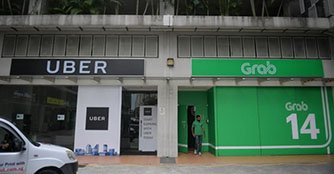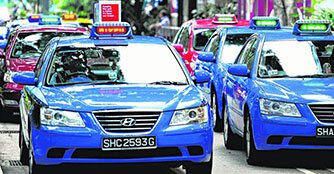Deal with Uber not off the table: ComfortDelGro chief
03 Apr 2018|1,740 views
Transport giant ComfortDelGro Corp will have to contend with thinner margins, higher debts, more mergers and acquisitions, and new businesses if it wants to continue growing, according to its long-serving chairman Lim Jit Poh.

The eventual arrival of autonomous vehicles, for instance, could be the next disruptor. But more immediately, ride-hailing apps have already impacted the group's earnings substantially.
In 2004, the year after its merger, ComfortDelGro posted net earnings of $200.6 million on a turnover of $2.14 billion - a margin of 9.4 percent. Last year, it posted earnings of $301.5 million on a turnover of $3.97 billion, or a margin of 7.6 percent.
"The group would have to expand the list of mergers and acquisitions by considering projects with lower margins, so long as the investments are profit-accretive, offer a lower level of risk and are priced reasonably," Mr. Lim said.
One recent - and now contentious - acquisition is Uber's Lion City Rentals, in which ComfortDelGro had sought to buy a 51 percent stake. The deal pertains to around 12,500 cars. Now that Uber has sold its South East Asian business to rival Grab, will ComfortDelGro continue with the deal, which has to be concluded by the end of September?
"If we believe that private-hire is a new revenue stream for us, then we should continue," Mr. Lim said. He said acquiring Lion City Rentals' hired-out fleet will give ComfortDelGro instant access to the private-hire business. The deal, however, is still pending approval from the Competition Commission of Singapore.

The acquisition - ComfortDelGro's largest to date - will cost the group $642 million, with $295 million to be paid in cash, and the rest from borrowings.
Mr. Lim said the group would, from here on, adopt 'a less conservative capital structure and move into a net debt position in order to fund growth'.
Recent moves, which reflect ComfortDelGro's appetite for lower-margin investments include its $15 million acquisition of 217 taxi licences and vehicles from Shenyang Tian Wen Taxi Co, which will grow the group's fleet in the capital of China's Liaoning province by close to one-fifth to 1,503 taxis.
It also acquired British coach operator New Adventure Travel - which runs 117 buses from South Wales - for $24.6 million. Mr. Lim would not say what the margins for these businesses were.
The chairman - who has been providing guidance to the board since ComfortDelGro was formed in 29th March 2003 - said the group is also 'exploring strategic alliances with start-ups to collaboratively work on commercial application of emerging technologies'. Again, he would not elaborate.
To prepare the group for the fast-evolving business landscape, Mr. Lim has shored up the board with new expertise. ComfortDelGro brought in a retired auditor, as well as a person 'in the forefront of the digital world'. Subsidiary SBS Transit roped in an accountant (it never had one before) and a lawyer. At Vicom, a technical testing specialist and 'a person well versed in the area of service industry' joined the board.

At the group's 10th anniversary five years ago, Mr. Lim said ComfortDelGro would garner 70 percent of its revenue from overseas in the next five to seven years.
Since then, markets such as the U.K., Australia and China have been accounting for no more than 50 percent of group revenue.
Has the group, once admired for its overseas forays, plateaued? Mr. Lim said there were several reasons for the outcome. First, he said, foreign exchange rates have been working against the group, with currencies in many of the markets where it operates weakening against the Singapore dollar.
"Some of the markets we are in have also undergone regulatory changes, and that has affected some of our businesses. Our local units have also been growing, so the balance has tilted," he added, referring to the growing rail and bus networks in Singapore.
But he said the group should be able to reach the 50 percent mark soon. Mr. Lim, a former senior civil servant, wrapped up the interview with an observation about commuters in Singapore. "Singaporeans have high expectations. This is not a bad thing. Certainly, it spurs everyone to do better," he said. "But expectations need to be balanced with the cost of delivery, be they bus or rail services."
Transport giant ComfortDelGro Corp will have to contend with thinner margins, higher debts, more mergers and acquisitions, and new businesses if it wants to continue growing, according to its long-serving chairman Lim Jit Poh.

The eventual arrival of autonomous vehicles, for instance, could be the next disruptor. But more immediately, ride-hailing apps have already impacted the group's earnings substantially.
In 2004, the year after its merger, ComfortDelGro posted net earnings of $200.6 million on a turnover of $2.14 billion - a margin of 9.4 percent. Last year, it posted earnings of $301.5 million on a turnover of $3.97 billion, or a margin of 7.6 percent.
"The group would have to expand the list of mergers and acquisitions by considering projects with lower margins, so long as the investments are profit-accretive, offer a lower level of risk and are priced reasonably," Mr. Lim said.
One recent - and now contentious - acquisition is Uber's Lion City Rentals, in which ComfortDelGro had sought to buy a 51 percent stake. The deal pertains to around 12,500 cars. Now that Uber has sold its South East Asian business to rival Grab, will ComfortDelGro continue with the deal, which has to be concluded by the end of September?
"If we believe that private-hire is a new revenue stream for us, then we should continue," Mr. Lim said. He said acquiring Lion City Rentals' hired-out fleet will give ComfortDelGro instant access to the private-hire business. The deal, however, is still pending approval from the Competition Commission of Singapore.

If approved, ComfortDelGro's deal with Lion City Rentals will create a group with a combined fleet of 25,500 taxis and private-hire cars
The acquisition - ComfortDelGro's largest to date - will cost the group $642 million, with $295 million to be paid in cash, and the rest from borrowings.
Mr. Lim said the group would, from here on, adopt 'a less conservative capital structure and move into a net debt position in order to fund growth'.
Recent moves, which reflect ComfortDelGro's appetite for lower-margin investments include its $15 million acquisition of 217 taxi licences and vehicles from Shenyang Tian Wen Taxi Co, which will grow the group's fleet in the capital of China's Liaoning province by close to one-fifth to 1,503 taxis.
It also acquired British coach operator New Adventure Travel - which runs 117 buses from South Wales - for $24.6 million. Mr. Lim would not say what the margins for these businesses were.
The chairman - who has been providing guidance to the board since ComfortDelGro was formed in 29th March 2003 - said the group is also 'exploring strategic alliances with start-ups to collaboratively work on commercial application of emerging technologies'. Again, he would not elaborate.
To prepare the group for the fast-evolving business landscape, Mr. Lim has shored up the board with new expertise. ComfortDelGro brought in a retired auditor, as well as a person 'in the forefront of the digital world'. Subsidiary SBS Transit roped in an accountant (it never had one before) and a lawyer. At Vicom, a technical testing specialist and 'a person well versed in the area of service industry' joined the board.

At the group's 10th anniversary five years ago, Mr. Lim said ComfortDelGro would garner 70 percent of its revenue from overseas in the next five to seven years.
Since then, markets such as the U.K., Australia and China have been accounting for no more than 50 percent of group revenue.
Has the group, once admired for its overseas forays, plateaued? Mr. Lim said there were several reasons for the outcome. First, he said, foreign exchange rates have been working against the group, with currencies in many of the markets where it operates weakening against the Singapore dollar.
"Some of the markets we are in have also undergone regulatory changes, and that has affected some of our businesses. Our local units have also been growing, so the balance has tilted," he added, referring to the growing rail and bus networks in Singapore.
But he said the group should be able to reach the 50 percent mark soon. Mr. Lim, a former senior civil servant, wrapped up the interview with an observation about commuters in Singapore. "Singaporeans have high expectations. This is not a bad thing. Certainly, it spurs everyone to do better," he said. "But expectations need to be balanced with the cost of delivery, be they bus or rail services."
Latest COE Prices
August 2025 | 1st BIDDING
NEXT TENDER: 20 Aug 2025
CAT A$102,009
CAT B$123,498
CAT C$70,001
CAT E$122,334
View Full Results Thank You For Your Subscription.




















